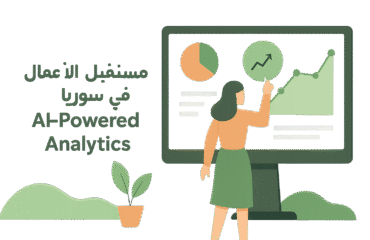
How Can Data Analytics Change Decision-Making in Syria?
- Data analytics are an essential necessity for making informed decisions.
- Investing in data analytics contributes to a deeper understanding of the current situation and future forecasting.
- Artificial intelligence supports advanced data analytics applications.
- Current challenges include data availability, quality, and infrastructure.
- Elite Data analysis contributes to improving decision-making and enhances community engagement.
Table of Contents
- Data Analytics: A Journey Toward More Informed Decisions
- Why Are Data Analytics Necessary in Syria?
- Artificial Intelligence: The Driving Force Behind Advanced Data Analytics
- Practical Applications of Data Analytics and AI in the Syrian Context
- Challenges of Applying Data Analytics in Syria
- The Role of Insight Syria in Overcoming These Challenges
- The Importance of Machine Learning in Improving Decision-Making
- Generative AI and the Future of Data Analysis
- Conclusion: Empowering Decisions for Syria’s Future
Data Analytics: A Journey Toward More Informed Decisions
Data analytics is the process of examining, cleaning, transforming, and modeling data to discover useful information, suggest conclusions, and support decision-making. It is both a science and an art, requiring a mix of technical skills, deep contextual understanding, and the ability to interpret and present results in a comprehensible manner.
Why Are Data Analytics Necessary in Syria?
- Deeper Understanding of Reality: Helps in collecting and analyzing information on demographics and living standards.
- Improving Process Efficiency: Identifying weaknesses in processes and suggesting innovative solutions.
- Predicting Future Trends: Developing models that help forecast changes.
- Supporting Public Policies: Providing insights into the effectiveness of current policies.
- Enhancing Community Engagement: Understanding citizens’ opinions and needs.
Artificial Intelligence: The Driving Force Behind Advanced Data Analytics
It’s impossible to talk about data analytics without mentioning the role of Artificial Intelligence (AI) and Machine Learning. AI gives machines the ability to simulate human cognitive abilities, such as learning, problem-solving, and decision-making.
- Big Data Analysis: Processing massive amounts of data with speed and accuracy.
- Recognizing Complex Patterns: Discovering hidden relationships and connections in data.
- Automation: Automating repetitive tasks.
- Accurate Predictions: Building sophisticated predictive models.
- Interactive Insights: Providing interactive tools for data exploration.
Practical Applications of Data Analytics and AI in the Syrian Context:
1. Governmental and Administrative Sector:
- Human Resource Management: Improving task distribution and reducing employee turnover rates.
- Improving Public Services: Analyzing citizen satisfaction with services.
- Urban and Infrastructure Planning: Identifying service needs and better residential area planning.
- Corruption Fighting: Analyzing financial transactions to identify suspicious patterns.
- Crisis Management: Directing humanitarian aid effectively and quickly.
2. Economic and Commercial Sector:
- Market Research: Understanding consumer behavior and identifying market segments.
- Marketing and Sales: Improving pricing strategies and increasing sales.
- Financial Risk Management: Evaluating credit risks and preventing fraud.
- Agricultural Sector: Improving crop productivity and managing water resources.
- Industrial Sector: Using predictive maintenance analytics for machinery.
3. Social and Civil Sector:
- Public Health: Directing health efforts and improving preventive programs.
- Education: Identifying areas for improvement and resource allocation.
- Understanding Social Issues: Developing more effective social policies.
- Media Monitoring: Understanding public opinion and monitoring discourse.
Challenges of Applying Data Analytics in Syria:
- Data Availability and Quality: Data may be incomplete or inaccurate.
- Technical Infrastructure: The need for robust infrastructure to support data analysis.
- Skills and Competence: Scarcity of experts in the field of data analytics.
- Awareness and Organizational Culture: The need to build a data-driven culture.
- Security and Privacy: The necessity to protect individuals’ data.
The Role of Insight Syria in Overcoming These Challenges:
We recognize the challenges and work on providing innovative solutions. Our team possesses expertise in:
- Data Collection: Designing accurate surveys.
- Data Cleaning and Processing: Using advanced techniques to ensure data quality.
- Advanced Analysis: Applying various data analytics tools.
- Delivering Insights: Turning data into actionable insights.
- Capacity Building: Providing training to institutions.
The Importance of Machine Learning in Improving Decision-Making:
Machine Learning helps in:
- Behavior Prediction Models: Understanding consumer behavior.
- Fraud Detection: Identifying abnormal patterns in transactions.
- Personalization: Enhancing user experience.
- Improving Logistics Operations: Managing demand and efficiency.
- Text and Sentiment Analysis: Understanding public opinion.
Generative AI and the Future of Data Analysis:
Modern tools of Generative AI provide:
- Generating Reports and Interpretations: Providing explanations in natural language.
- Answering Questions: Delivering analysis-based answers.
- Assisting in Code Creation: Accelerating the development process.
- Scenario Design: Exploring “what-if” scenarios.
Conclusion: Empowering Decisions for Syria’s Future
Data analysis is an investment in the future. At Insight Syria, we help our partners gain deeper understanding and make more informed decisions. We are here to turn your data into tangible value and make your decision-making process more effective and accurate. We look forward to being your partner in this journey to build a more prosperous and stable future for Syria.
Frequently Asked Questions
What is the importance of data analytics in Syria?
Data analytics help in understanding reality and addressing social and economic challenges.
How can artificial intelligence enhance data analytics?
Artificial intelligence can improve the accuracy of analytics and increase the speed of processing and analyzing big data.
What are the main challenges facing the application of data analytics in Syria?
Challenges include data availability and quality, as well as technical infrastructure and cultural awareness.



